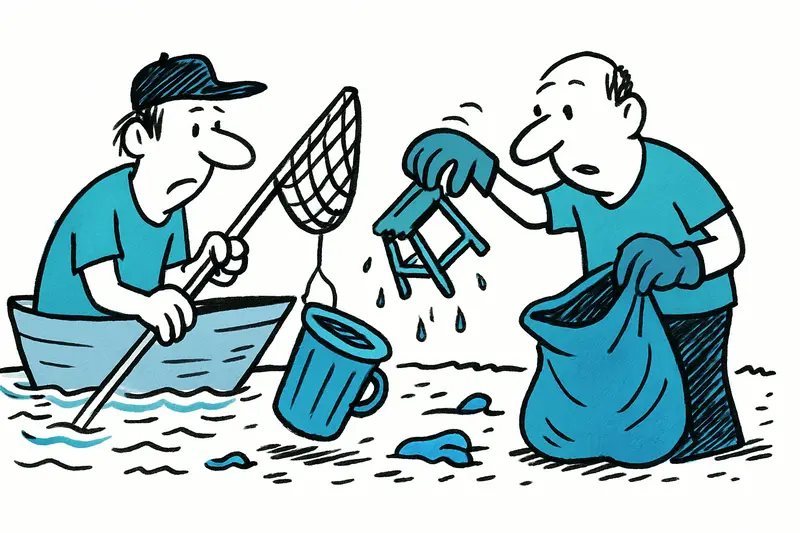In August, teams off the Balearic coasts pulled more than 6.7 tons of waste from the sea – nearly three tons off Mallorca alone. From plastic to baby strollers, everything was found.
Coastline Cleanup: More than 6.7 Tons of Trash
During August, more than 6.7 tons of trash were recovered from the water off the Balearic coasts. This was reported by the port authority of the archipelago. Almost three tons come from the waters around Mallorca — the rest is spread across Menorca, Ibiza and Formentera.
What Was Pulled from the Sea
The finds are sometimes surreal: alongside the usual plastic parts and driftwood, the volunteers also found batteries, pieces of furniture and even a baby stroller. Such finds remind us that what lies beneath the surface and on the sea floor is often more than meets the eye at the beach.
I was out a few days ago early in the morning in Portixol when the volunteers were pulling a large piece of wood ashore. The sun was low, a light breeze blew from the sea. An older volunteer told me with a laugh: “Sometimes we think we’re on a treasure hunt – only the treasure has no value.”
Who is Collecting and How Much Longer?
The coordinated cleanup operation continues until the end of September. On board small boats and with diving teams, especially heavily polluted spots are tackled. Public authorities work with voluntary groups and beach wardens. Morning deployments, when the water is calm, often yield the most haul.
On Mallorca, teams have recently focused on coves and places that tend to wash up trash after strong winds or rain: areas near Palma, as well as quieter spots like Port de Pollença and Cala Millor. The collected waste is separated, recycled as far as possible, or disposed of properly.
Why the Numbers Matter
Such amounts show that the problem is neither local nor small. Plastic decomposes, enters food chains and can harm animals. The appearance of batteries and furniture adds concern about pollutants. For many residents this is visible – and for tourists who expect clean beaches, it is anyway a topic.
A fisherman from Alcúdia commented: “After a storm, something strange always washes up. We’re used to it, but it must not become normal.” He is right. The actions are important, but in the long run only less trash at the source and better collection systems on land help.
How You Can Help
If you want to join: Local volunteer groups regularly organize beach cleanups, often early in the morning. Small behavioral changes also help: dispose of trash properly, avoid single-use items and leave waste at designated collection points.
The cleanup work by authorities goes on — visible, tedious and necessary. And yes, it’s frustrating that we find mountains of plastic every year anew. But the many volunteers who arrive in the mornings with gloves and trash bags are a good sign too. They show: if we all pitch in together, a lot can be moved.
Similar News

Die Zeit auf Mallorca: Warum die Uhren hier anders ticken
Auf Mallorca läuft die Uhr offiziell anders als die Sonne — ein Erbe aus den 1940er-Jahren, das bis heute unseren Alltag...

Orange Weather Warning for Mallorca: Heavy Rain and Thunderstorms Set the Week
Aemet warns: Monday and Tuesday on Mallorca are under orange alert. Heavy rain, floods, and traffic disruptions are poss...

Life-threatening swimming accident in Ibiza: 73-year-old revived on the beach
During severe storms, a 73-year-old visitor swam despite a red flag. Lifeguards rescued her, and she is now seriously in...

Mummified Body Found in Abandoned House Near Santa Margalida
Between Can Picafort and Son Serra de Marina, teenagers discovered a mummified corpse in an abandoned house. Identity an...

Large Rockfall Blocks Ma-2141 Road Near Sa Calobra
After heavy rainfall, several rock blocks toppled onto the winding Ma-2141 toward Sa Calobra over the weekend. The road ...
